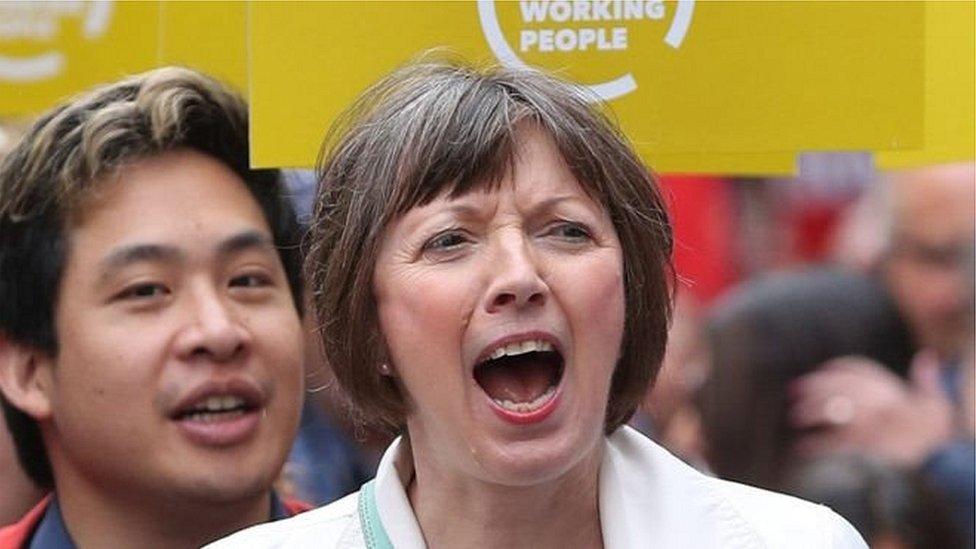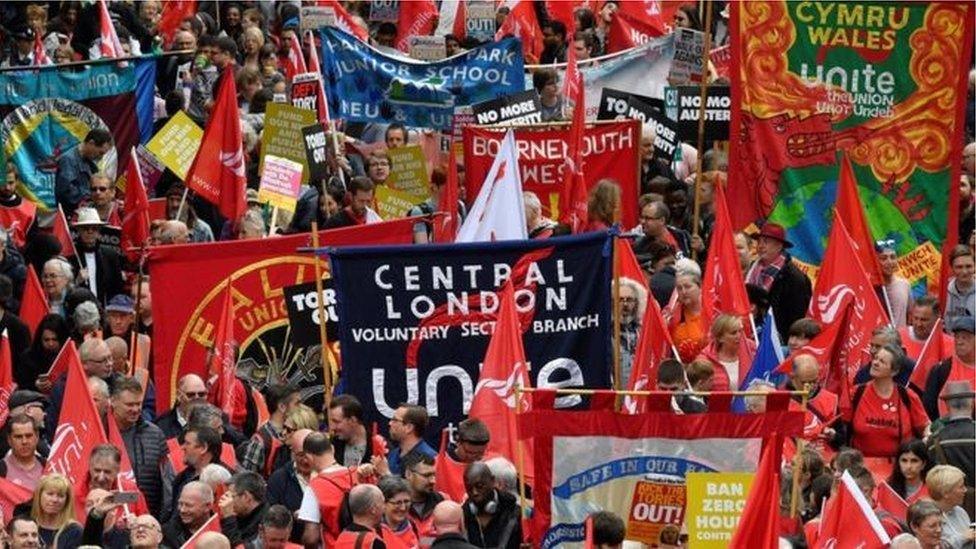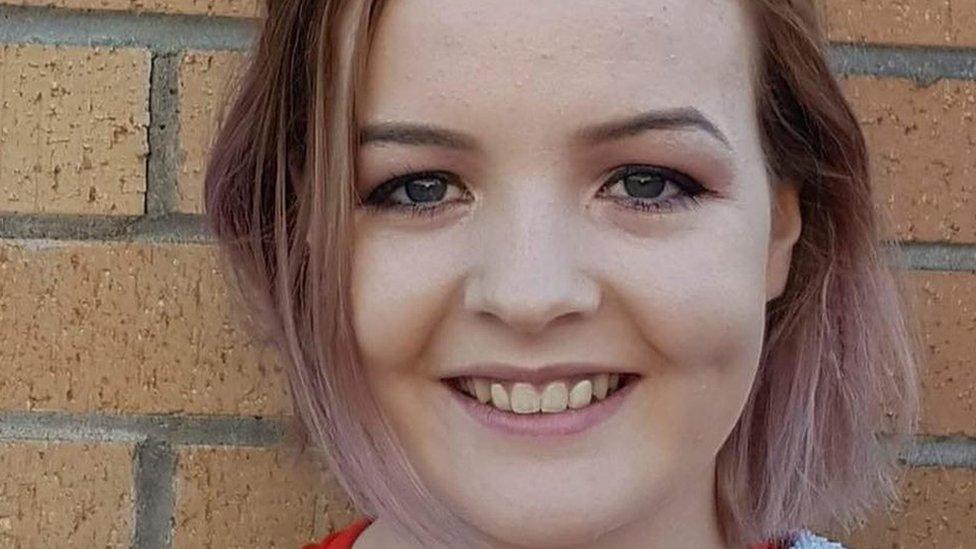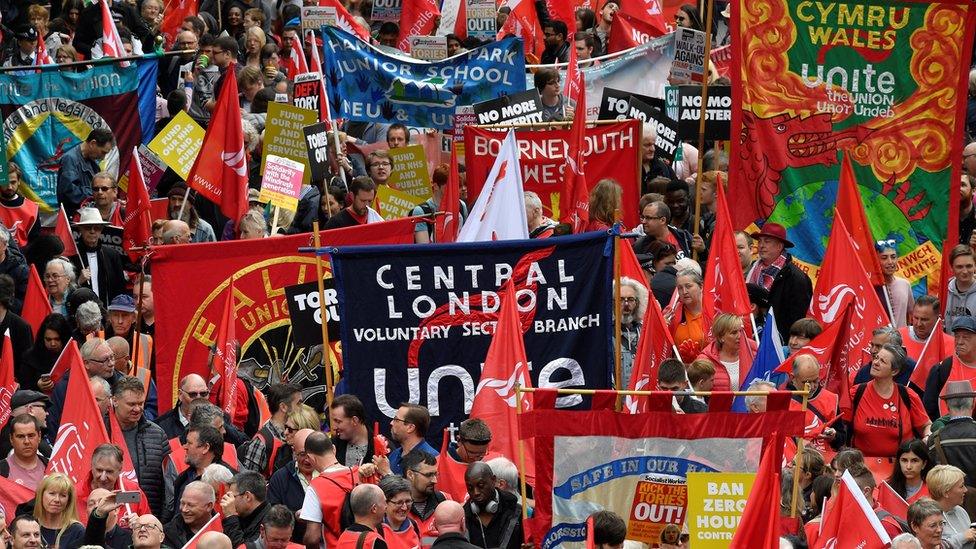Under-30s turn away from unions despite wage stagnation
- Published
- comments
The TUC's Frances O'Grady spoke to economics editor Kamal Ahmed
The number of people under the age of 30 who are members of a trade union has fallen significantly since 2001.
Figures from the Trades Union Congress provided to the BBC reveal membership levels among the under-30s have fallen from 20.1% in 2001 to 15.7% in 2017.
In the private sector, which employs more than 80% of 21 to 30-year-olds, the figure fell from 12.6% to to 9%.
It comes despite the pay gap between younger and older workers rising by more than half in the past 20 years.
Younger people are also much more concerned about "insecure work" and their financial position.
Pay gap
Frances O'Grady, the general secretary of the TUC, admitted the union movement had "a problem" in reaching young people.
And it needed to show the under-30s that unions are still relevant in an era when higher-educated young people have actually seen average earnings drop over the last 20 years.
On average, being a member of a union means your pay is higher - although that is often to do with the sector worked in and the size of the employer.

Frances O'Grady has led the TUC since 2013
A new report from the TUC to mark the 150th anniversary of its foundation in Manchester in 1868 revealed that over-30s are now paid 21.9% more than under-30s, compared with 14.5% in 1998.
That means that on average, young people are earning £2.81 an hour less than older people, up from £1.51 an hour less in 1998.
Although it would be expected that older people earn more than younger people, the slower pace of wage growth among the young has increased the gap.
Older people are on average earning £5,884 a year more than younger workers, compared with £3,140 a year in 1998.
'Sympathetic'
Ms O'Grady said many young people felt they were in insecure employment in sectors such as health care or retail sales, but were not turning to the unions for support.
Many employers also made it difficult for people to become a member of a union, she said.
She also admitted that unions had to "earn the right" to represent people at work.

Union membership has fallen from its 1970s heyday
"We know we've got a problem," Ms O'Grady told me.
"We know that young people overwhelmingly are sympathetic to our vision and our values. The problem is that many of their employers, especially in the private sector, make it hard for us to organise them."
Of employees of all ages, 23.2% are a member of a union, itself the lowest figures since records of the percentage figure began in 1995.
Zero-hour contracts
The overall membership of trade unions - at 6.9 million - is well below its peak above 13 million in the late 1970s.
"If you think about where young people are working in hospitality or retail care industry, often on temporary or zero-hour contracts, often in franchise organisations that are hard to organise, the model that we have isn't working for them," Ms O'Grady said.
"We've got to fix it, and we've got a chance, we're in the 21st Century, we can use 21st Century tools like digital to organise young people in new ways that suit them and give them what they need."
The TUC report revealed that younger people were now more concentrated in lower-paid sectors such as private social care or hotels and restaurants.
A survey of 1,500 young people suggested that a quarter had struggled with living costs and that 41% had put off buying or moving home because of concern about finances.
Just a third believed that their job made the best use of their skills.
"What young people are telling us is that they feel stuck, they're stuck in low-paid insecure employment, they don't know how to get out or get on," Ms O'Grady said.
"What they really want is an online shop steward, an online coach, who will support them in getting the skills and the opportunities they want to make a life for themselves."
'Male, pale and stale'
She admitted the trades union movement needed to do more on diversity.
"I want us to look like modern Britain, a little less of the male, pale and stale and a bit more of the diversity of Britain," Ms O'Grady said.
"Our leadership looks a lot better than most of the leaderships you would find in the boardroom, or indeed in politics, but that's not good enough for me.
"We've got to look like the people that we aim to represent - including young people."
- Published18 April 2018

- Published12 May 2018
